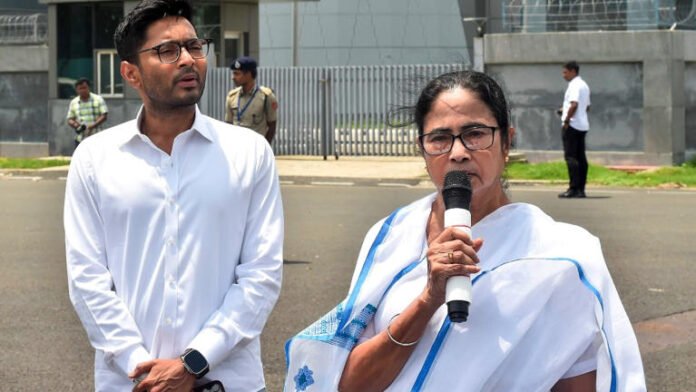The sources have revealed a significant rift between West Bengal Chief Minister Mamata Banerjee and her nephew, party leader Abhishek Banerjee, over the controversial transfer of a former principal of a prestigious Kolkata college. The issue, which started as a routine administrative matter, has now ballooned into a political standoff that is being closely watched both within and outside the party.
The Background of the Transfer Dispute
The controversy centers around the transfer of the ex-principal of a prominent Kolkata college. According to sources, the former principal had earned a reputation for being a diligent and student-friendly administrator. However, several political complications started to emerge during her tenure, including allegations of interference in her functioning by external forces aligned with the TMC’s youth wing.
As the principal’s popularity among students and faculty grew, so did her opposition to what some sources describe as a “growing politicization” of the college administration. This led to growing tensions with certain members of the TMC, particularly those seen as loyal to Abhishek Banerjee, who has been increasingly consolidating his influence within the party.
In response to these developments, the education department ordered her transfer—a decision that reportedly came as a shock to many. What was originally viewed as a bureaucratic reshuffle has now turned into a significant flashpoint between two of the most powerful leaders in Bengal’s ruling party.
Mamata Banerjee’s Position
Mamata Banerjee, the founder and face of the Trinamool Congress, has long been a vocal critic of the over-politicization of educational institutions in Bengal. Known for her fiery speeches and people-first policies, Mamata has always maintained that colleges and universities should remain as centers of learning rather than battlegrounds for political influence. Her emphasis on autonomy in education has won her both admirers and critics over the years.
According to sources close to Mamata, she was reportedly displeased when she found out about the decision to transfer the ex-principal, believing that the decision was driven more by political factors than administrative necessity. She was particularly perturbed by the perception that the decision was made without her direct involvement, and that it represented an overreach by factions loyal to her nephew.
In private, Mamata is said to have expressed frustration over the growing assertiveness of younger leaders within the TMC, especially Abhishek, who has emerged as a powerful figure in the party’s internal dynamics. Sources say that she feels that the influence of these factions risks undermining her long-standing principles, including her stance on keeping education free from excessive political control.
Abhishek Banerjee’s Influence
On the other side of the issue stands Abhishek Banerjee, Mamata’s nephew and widely considered her political heir. Over the last few years, Abhishek has risen to prominence within the TMC, leading the party’s youth wing and playing a key role in several electoral campaigns. With the political landscape in Bengal shifting, Abhishek has positioned himself as the leader of the TMC’s next generation.
According to insiders, Abhishek supported the transfer of the ex-principal as part of a broader strategy to consolidate the party’s influence in educational institutions, which he views as key to maintaining the TMC’s grip on Bengal’s urban electorate. Those close to him argue that this kind of maneuvering is necessary in a political environment where control over colleges can have significant electoral implications, especially in student-heavy constituencies.
Abhishek’s supporters also argue that Mamata, while the undisputed leader of the TMC, is too focused on maintaining her established ideals at a time when political realities are shifting. They see Abhishek’s more pragmatic approach as essential to keeping the party relevant and competitive in Bengal’s changing political landscape.
Implications for the TMC
This internal rift comes at a delicate time for the TMC. With national elections approaching, the party is under increasing pressure to present a united front. While Mamata Banerjee remains a towering figure in Bengal’s politics, her nephew’s growing influence has created a power dynamic that could have lasting implications for the party’s future.
Observers are keenly watching how this disagreement over the transfer will play out. If not managed carefully, it could signal a broader split within the TMC’s ranks, especially as younger leaders like Abhishek seek to assert their vision for the party. At the same time, Mamata’s continued control and her ability to navigate these internal tensions will likely determine the TMC’s path in the years to come.
For now, the transfer of the Kolkata college principal may seem like a minor issue, but it has opened the door to a much larger conversation about the future direction of the TMC and the balance of power within one of India’s most influential regional parties.

